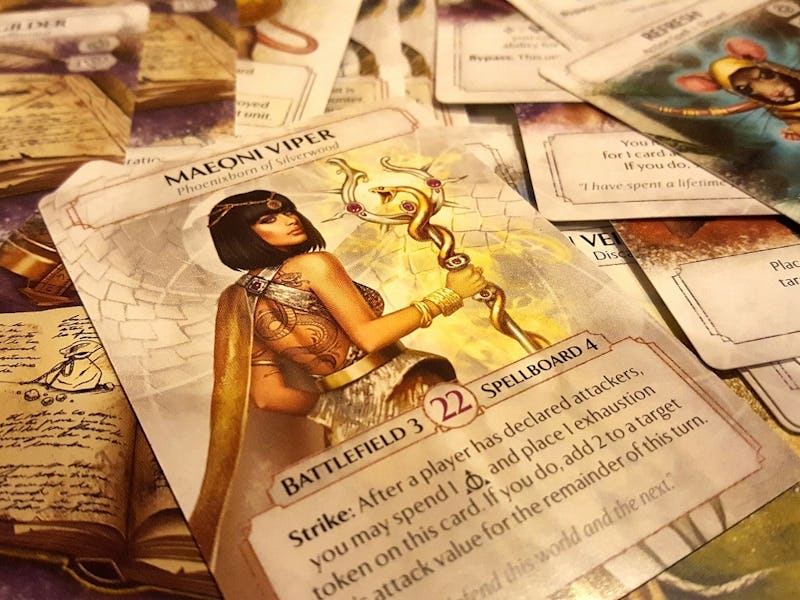Ashes: Rise of the Phoenixborn Brings Dice to a Card Fight
It's a dance of dice rolling, deck building, and dealing wound tokens at ten paces.

In the card game, Ashes: Rise of the Phoenixborn, you are an uber-powerful wizard trying to slay your opponent, who is also an uber-powerful wizard, natch. Both of you are capable of summoning monsters, recruiting allies, and blasting spells — so long as you’re holding the right card and rolling the right dice. Your goal, as it tends to be in these sorts of games, is to whittle down the enemy wizard’s life to zero, by strategically attacking and countering with your minions.
If Ashes’s premise — and the subtitled name — evokes Magic: The Gathering, that’s because Magic plays Homo erectus to Ashes’ Homo sapiens. You couldn’t really have the latter without the former. The metaphor isn’t perfect; Magic is two decades old, but shows no signs of going extinct. And simply because a game reflects its ancestors doesn’t mean it can’t bring something new to the tabletop. To its credit, Ashes feels as fresh as a newborn bird bursting forth from a flame — and, occasionally, it’s just as glorious.
Let’s talk life-whittling, for instance. Dealt by your abilities and minions, damage comes in little slices or sizable chunks of wound tokens. Fairly standard stuff. But Ashes, unlike Magic or Blizzard’s digital card game Hearthstone, doesn’t adhere to the typical script that snowballing resources gives you increasingly powerful dudes.
In the archetypal dueling card game, each turn you can acquire a resource, which will accrue until you have enough for game-ending spells. In Ashes, you’ll always begin a round with a pool of 10 dice that power your magics. (The dice have a variety custom faces dictating which cards they can fuel.) What’s more, you arrive at this duel hefting a pistol loaded with your favorite bullets — the game begins by rifling through your deck for five cards, which form your starting hand.
If you’re a veteran of Magic, you might be wondering how a game lasts more than one turn — if a Magic player were able to stack his or her opening hand every game, whoever goes first would simply deliver a turn-one game-breaking combo. But Ashes keeps itself together by limiting players in other ways: namely, what you’re allowed to do per turn, and the fact that you’re at the mercy of dice.
On a turn-by-turn basis, you can take only one main action — like conjuring a unit to the battlefield, or attacking with one — and a typically less-powerful side action. This prevents players from dumping their entire hands in a single go, and they’re further restricted by their Phoenixborn character’s attributes. You select a wizard (er, Phoenixborn) at the beginning of the game. This can be gruff warrior Coal Roarkin or sultry conjurer Maeoni Viper (you get the idea). Each has limits on how many spells or monsters can be on their side of the table, as well as variations on life totals or dice-fueled abilities.
But the most brilliant main action is the ability to pass: You don’t do anything at all, and play moves to your opponent. By not taking an action, you might be leaving yourself exposed — but you might also be able to bait your opponent into attacking your Phoenixborn, in turn leaving his or her character undefended. (Units that have attacked can’t block.) Where games of Magic or Hearthstone crest to a victorious tidal wave, Ashes is more about ebb and flow — like kelp waving in the ocean, if the kelp had knives tied to their frond tips and wanted to murder each other.
This stabby dance of action and inaction goes back and forth until both players consecutively pass. Then, cards are drawn and power dice are re-rolled. The dice certainly add variance to the game, but Ashes opens up certain avenues for players to mitigate unlucky rolls.
The gameplay is fun, the art is great, and there’s a lot you get for your buck — 250 cards, fistfulls of tokens, and 40 custom power dice. But if there’s anything that keeps Ashes from soaring to the pantheon of revolutionary games, it’s that we’re left wondering how vital of a game Ashes is. Don’t get us wrong — Ashes is very good. If you’re hankering for a fresh take on slinging cardboard, don’t really like Magic or new to the genre, there’s a solid chance Ashes will shine.
But we’ve had a bumper crop of fantastic fantasy card games in recent years, like Hearthstone, Ascension, and Summoner Wars; asymmetrical card games pioneered by the cyberpunk game Netrunner; as well as the rise of non-fantasy deck-building card games like Dominion, Race for The Galaxy, and Star Realms. Can a wizard-on-wizard card-slinging game secure a place on the board game shelf if it’s not quite a revelation? That’s a tougher question for Ashes to answer.